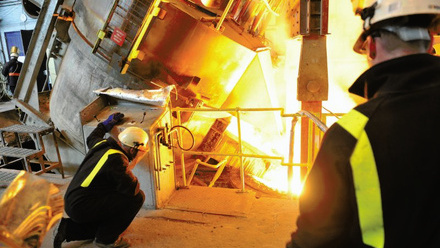Trained and ready for the energy transition?
As energy generation shifts from fossil fuels, a workforce is needed to meet the challenge - many oil and gas professionals with transferable skills are ready to go.

'The net-zero transition will be one of the dominant labour market trends of the next 30 years,' asserts OPITO – the energy sector skills body.
They note that one in five workers in the UK, which is around 6.3 million people, can expect to see the demand for their skills increase or decrease over that period due to this major shift. Those working in oil and gas – onshore and offshore – have skills that remain in high demand.
OPITO explains, 'If you take offshore wind alone, it could support up to 90,000 jobs as the UK Government targets 50GW of capacity by 2030. Roles will be required at all stages of the project lifecycle, including in design, manufacturing, construction, installation, operations and maintenance. Employment demand will be strongest for consenting skills, mechanical and electrical disciplines, and for engineers both onshore and offshore.'
Meanwhile, 'according to the UK Net Zero Strategy, carbon capture utilisation and storage (CCUS) could support up to 50,000 jobs by 2030, as the UK Government targets four CCUS clusters. The transport and storage elements of CCUS are well-suited to the specialist technical expertise and skills of the UK oil and gas workforce'.
And hydrogen production 'could support tens of thousands of direct and indirect jobs by 2030. Project management, process engineering, repurposing of infrastructure and gas safety are some of the key skills required to support the growing hydrogen sector. The oil and gas workforce possesses many of these skills'.
As part of OPITO’s work leading the North Sea Transition Deal’s People and Skills Strategy, its research shows that those working in the UK oil and gas industry are keen to work in renewables.
The skills body says, 'There are also many opportunities for those working outside oil and gas. It is vital that the industry attracts people from the widest possible pool, including skilled people from other engineering and technology sectors, those transitioning from careers in the military, and those with softer, less technically orientated skills too.'
The Energy Skills Alliance is a cross-industry group led by OPITO, bringing together leaders from across the oil and gas, renewables, nuclear and refining industries, as well as representation from within regulators, governments and trade unions.
One of its aims is to produce a clear forecast of energy skills demand, for both the short term and up until 2050. But it is also focused on an all-energy training programme. This is designed for the existing workforce, in conjunction with the North Sea Transition Deal People and Skills plan, to maintain the strengths already established in the oil and gas sector – but 'providing the next leap of transferability to alternative energy careers. The People and Skills Strategy will reskill and enable fluidity of people across the energy sector'.
OPITO adds, 'This year [our long-standing] Oil and Gas Technical Apprentice Programme is rebranding with a new name, APTUS, meaning to adapt, to adjust and to be prepared. This reflects the evolution of both the programme and the entire industry as the energy transition gathers pace.
'Over the four-year scheme, apprentices will explore multi-disciplinary modules to develop transferable skills…to deliver conventional energy sources as cleanly, efficiently and securely as possible, while charting the pathway to newer, cleaner sources and net-zero.'
Flexible and fluid
Other organisations with close links to the oil and gas industry are also leading the way to enable fluidity between traditional and alternative energy sectors.
Robert Gordon University in Aberdeen, which has strong ties to the offshore oil and gas industry operating in the UK North Sea, is home to an Energy Transition Institute.
Its 2023 report, Powering up the Workforce – The future of the UK offshore energy workforce, is clear that maintaining investment to meet stipulated targets for renewables, hydrogen or CCUS is critical to secure the UK’s future offshore energy workforce.
The report states that 'A successful transition will see the UK offshore energy workforce increase by approximately 50% to 225,000 people by 2030. Failure to realise its full potential will see the workforce decline by around 15% to 130,000 over the same period.'
To break these figures down, it continues, 'A managed and just transition from oil and gas to renewables will see the oil and gas workforce numbers decline from 120,000 today to around 87,000 by 2030 (in line with production decline and decommissioning activities). A more rapid decline in the oil and gas sector, through a halt to new investment and an accelerated production decline, could reduce the oil and gas workforce by 50% to around 60,000 people by 2030.
'Over the same timeframe and depending on the level of ambition realised, the UK offshore renewables workforce is expected to increase from around 34,000 in 2023, up to 138,000 in 2030.
'In a successful transition, approximately three in five people in the offshore energy workforce are expected to support the renewables industry by 2030, compared to one in five in 2023.'
The future workforce, the publication notes, is in large parts already here. It says, 'Over 90% of the UK’s oil and gas workforce possess skills that have medium-to-high transferability to the offshore renewables sector, though there may be an ongoing need for targeted retraining or upskilling to bridge any gaps.'
It continues, 'With over 100,000 people expected to move across or enter the UK offshore energy industry during the 2020s in the success case, there will be a key requirement to introduce readily accessible induction training to support the various energy sectors'.
The report notes, 'There is a workforce ‘goldilocks zone’ during the period 2024-28 when the UK supply chain capacity/capability can be sustained and developed, and the transferability of the offshore energy workforce can be optimised'.
Professor Paul de Leeuw, Director of the University’s Energy Transition Institute, notes that its long-standing relationship with the energy industry enables them to keep a close eye on the training needed. 'We work with industry partners all the time to figure out what is most relevant.'
This includes undergraduate and postgraduate programmes as well as continuing professional development to help industries be as smart and sustainable as possible.
David Nash, Director of Strategy and Policy at the Engineering Construction Industry Training Board (ECITB), says, 'For those looking to transition, take every opportunity to find ways to educate yourself about those opportunities that are available and take advantage of whatever training comes your way.'
He stresses the need for a constant professional development mindset, and hopes the UK Government’s lifelong learning loan entitlement, when it comes in, will create a 'cultural step-change in this country'.
'As a country, we don’t really have a mechanism to enable people to study later in life. They tend to do so out of their own pocket, or if they’re lucky, they have an employer willing to do it for them. So, I think that will be a key policy lever to encourage this.
'We’ve spent…over £1mln of our Levy on net-zero related training…precisely to help existing workers upskill and reskill.'
Nash stresses that those working in the conventional energy sectors have skillsets that will take them far into the future. 'They’re already in a really good position to harness those opportunities. My advice would be put yourself in a position to gain experience by working on these projects. Look around at what training support is out there, both from ECITB and other sources.'
Richard Oblath FIMMM, Chair of the IOM3 Energy Transition Group, echoes this sentiment. 'If someone is interested in energy in its broadest sense…the skills that were needed in the last 40 years are the same skills that are going to be needed in the decades to come.
'Those are mechanical and electrical skills that have been used in many areas…[that can] easily transfer with relatively little upskilling.'
As far as job numbers go, he says, 'there are going to be just as many people needed in the energy transition [if not more] as were in oil and gas…I think that’s positive news.'
Full steam ahead?
However, the demand for skills in alternative energy sectors will only come if government ambitions are realised, emphasises de Leeuw, but we have a long way to go.
He points to the UK target for 50GW of offshore wind energy to be installed by 2030. Yet the latest counts, he notes, are somewhere around 14-15GW as of January this year. If this 'apparent gap' is to be filled, an awful lot of activity and investment is needed.
He adds, 'We are [also] not anywhere near that 30Mt total activity target for carbon capture…So targets are there, the ambition is there, the willingness is there, but of course, you need to have the frameworks in place.'
de Leeuw suggests activity in the UK may not be great enough to keep the current workforce busy. 'They are highly qualified so they will just go and work overseas.' He thinks the question will not just be about jobs but flexibility and adaptability to move between regions. The success of the energy transition is, he says, in building a UK-based workforce.
Although Oblath sees a role for government to realise the ambitious targets, 'the marketplace is a bigger driver than the government in this area'.
Nash is positive about the potential for the skills transition, saying, 'The renewables sector has been growing for some time over the course of the last couple of decades', with a significant growth in the number of vacancies within the UK and globally.
'Those companies [in the fossil-fuel-based energy sector] are realising that they need to change their business models and increasingly are looking to operate in not just sectors like offshore wind, but increasingly in sectors such as hydrogen production, carbon capture…'
But he agrees with de Leeuw, 'I think, fundamentally, those opportunities will link to how many new projects get sanctioned through the process....That competition [for talent] isn’t just within the UK, it’s a global competition.'
Ultimately, de Leeuw says, 'If you deliver less, invest less and have less activity, you need fewer people, fewer skills, and these are very important relationships.'
Talking about valuable skills, he says, 'what is critical is the capability to build things…We need people with vocational skills particularly on the building sites'.
Nash was keen to stress that many of the roles the ECITB supports will be key to delivering an expansion of renewable energy. In short, 'These roles are in demand and they’re in demand across multiple sectors of the economy…Whether that’s in the energy sector, whether that’s in construction, whether that’s in sectors like rail, or even automotive and defence'.
The ECITB has a Labour Forecasting Tool to build an industry-wide view. Nash says, 'We’re looking at potentially peak labour demand as early as 2028. We think there can be 40,000 new roles required…it doesn’t give us a huge amount of time to act.'
He continues, 'The key challenge we’ve got is how do we ensure that a sufficient number of people transition to the growing number of vacancies…and we are only going to solve it if we can significantly increase the rate at which we train young people and other adult workers to transition into these roles for the energy sector.' He notes, there is a risk of training workers who may go overseas for opportunities.
He ruminates, 'There is clearly a classification of what a green job is, which people commonly associate with solar panel installers, electric vehicle manufacturing…[But] we won’t build a clean energy system if we don’t have sufficient numbers of electricians, welders, mechanical engineers.
'They may not currently be working in a green sector, but we will need them…to decarbonise the energy and heavy industry.'
He sees a role for industry, bodies like the ECITB and government to collectively promote the career opportunities.
Oblath, like Nash and de Leeuw, is conscious of the potential skills shortage. 'The energy transition overall has meant that a lot of people decided not to take on the traditional roles that lead into oil and gas and mining professions.' Whereas these skills are still needed.
He also notes that many among the older generation have not taken up the opportunity to transition into a new energy area, causing a skills shortage.
This situation is exacerbated given the decline in training provision in certain disciplines and challenges in recruiting the next generation as existing older professionals leave the workforce.
Oblath explains, 'An example would be someone who traditionally would have been a petroleum geologist so they really understand subsurface work, which obviously for oil and gas was very important in exploration. They are needed in the carbon capture and geothermal areas – exactly the same skills.' But he notes the number of universities offering that training has dropped because of the assumption these skills wouldn’t be needed and because students were not applying for such courses – universities are supply and demand driven.
Oblath laments, 'I think that we are also desperately short of young people entering into STEM fields.
'If you’re a young person who is currently in middle school or going into secondary school, all you’ve heard about for the last 15 years is oil and gas is bad, energy is bad. And we’ve done a very bad job of explaining why we need the skills of a petroleum geologist, [or those used in] mining and engineering for the energy transition.
'Those of us in leadership positions have made a mistake here – the remarketing of some of these skills could have brought more people in and that’s happening now.'
For example, OPITO’s hub called 'My Energy Future' helps users discover more about careers in the energy sector and signposts them to other relevant external resources.
It is also collaborating on the Energy Skills Passport project, which aims to streamline the transfer of skills and address the lack of recognition of cross-sector skills. The Passport will display an individual worker’s current qualifications and the required credentials to transition into another energy sector, supporting oil and gas workers to move to another energy sector.
They insist, 'We want to make sure our training and standards are undertaking their own evolution too.'
The ECITB has been working on a skills passport as well, which allows workers to demonstrate that they hold the relevant competencies to work in different sectors.
Future moves
Oblath says, 'There are going to be areas where employment goes up and areas where it will diminish. And it’s not a skills problem, [more] it’s a willingness to relocate.'
He continues, 'That’s a big challenge for younger people. But we’ve seen that throughout history, people have gone from rural areas into towns, people have gone from mining to oil and gas. It’s painful when it’s going on, and I think that’s where the government does have a role – to make sure there’s a safety net.
'We’re envisaging the need for a more mobile workforce…personal mobility, personal flexibility will be an attribute that will be needed and the ability to handle change.'
de Leeuw says of the future, 'The destination is clear. We need to get to net-zero…This is where the big opportunity is, so it’s an exciting future for all people in the right age group, incredible starting point...it’s not just about delivering targets for the country, it’s also about [developing] careers'.







